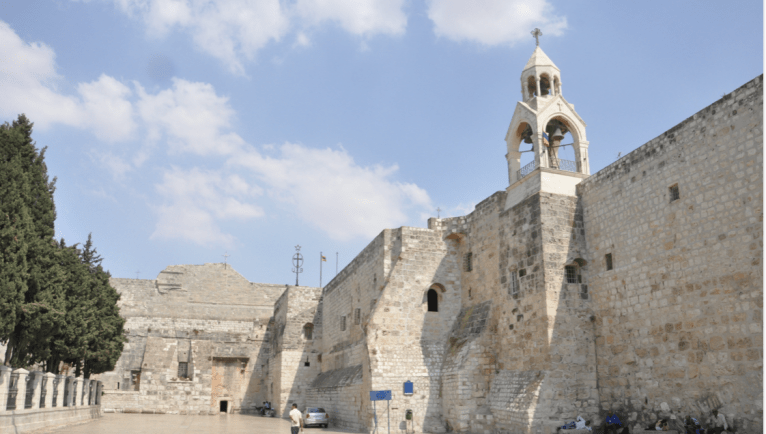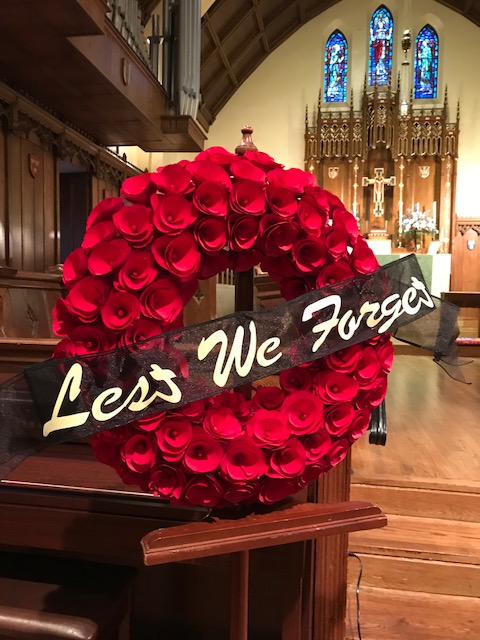Sermon for February 15, 2026
Readings:
It can be very hard to talk about holy and mystical moments and experiences in life. Some things just touch us so deeply and personally that they defy explanation. To talk about them can feel sacrilegious and you can feel this even if you aren’t religious. The birth of a child, the death of a loved one, viewing a stunning natural wonder, or even having an incredible meal…these things can be experiences that are really hard to convey with words. We may also experience things that are so outside our understanding of the natural world that it may be embarrassing to talk about them. We don’t want people to think that we have totally lost our grip on reality. Our experience of the world is not always as simple as we would like it to be. Sometimes the most profound things are the most difficult to talk about.
This morning our gospel reading was the story that we refer to as the Transfiguration. The disciples Peter and James and John had a mystical experience of Jesus on top of a mountain. They were some of his closest followers, and I am sure that they were hoping for some private one on one time with their teacher and leader. But what they got was so much more. They had an experience, an encounter. They saw Jesus transfigured. His image changed. There was a light that shone from him that they hadn’t seen before. To make it even more bizarre, they saw the figures of Moses and Elijah on either side of Jesus talking to him. God was trying to show them something. There was a deep connection between Jesus and Moses and Elijah. And then there was a voice from heaven: “this is my son the beloved, listen to him.” No doubt, these disciples had all been hoping that if they went up the mountain alone with Jesus that he would finally answer some of their more pressing questions, but that isn’t what happen. Sometimes we come to God looking for answers and we walk away with more questions, and that is certainly what happened to Peter and James and John. They experienced something that was really unbelievable, and at first it frightened them.
I am sure that those three disciples were relieved when Jesus told them not to tell anyone what they just saw, because who would have believed them anyways? It wasn’t time yet. Some holy encounters you have to hold onto for a while. But we know that eventually Peter and James and John did share their experience of Jesus on the mountain. Peter alludes to it in his letter this morning, it was remembered by the other disciples and recorded in the gospels. Those three disciples shared their experience of Jesus on the mountain with the rest of the community after Jesus rose from the dead and everyone was stunned and wondering how to make sense of what just happened. After the Resurrection, the experience that Peter and James and John had in private would help to shape the church’s collective understanding of who Jesus was as the son of God and what his life and ministry was all about. Three individuals had a private encounter with God; their experience was their own; and yet all of us in the church are blessed by it.
The Christian life is a funny thing. We come to God individually, but as a group. And if that sounds like an obvious contradiction it is because it is. Our faith is filled with such paradoxes. We are baptized one by one, as individuals, and yet we become a part of something larger than ourselves: the Church. Christ’s body. We have individual relationships with God, but we are undeniably shaped by the community around us. We are many and we are one at the same time. We each have the capacity to experience God individually, and yet our collective understanding of God, as the church, is never defined by the experience of one person. That is why Peter says in the epistle this morning that “no prophesy of scripture is a matter of one’s own interpretation, because no prophecy ever came by human will, but men and women moved by the holy spirit spoke from God.” The scriptures belong to all of us, collectively. They were written by human hands, but the message is from God and for all of us. So, in order to read them faithfully we need each other. No one human being has the final say on the interpretation of scripture. The final say will ultimately always belong to God, but until we meet God face to face, we will need each other. We need each other’s insights and wisdom. We need each other’s experiences. That is what has shaped our faith over the centuries.
There is a famous eighteenth-century French lawyer and philosopher names Jean Anthelme Brillat Savarin. He became especially famous as one of the world’s first food writers. He is known for saying “tell me what you eat, and I will tell you what you are.” I always thought that that was a line that Christians should ponder as they come forward for communion. Well, he wrote this book called the Physiology of Taste, and yes it is the sort of thing I read when I am on vacation because I am lots of fun. Anyways, in this book Brillat Savarin writes that “the sciences…are children of time and are formed insensibly by the collection of the methods pointed out by experience…” Sciences are the children of time. They are formed by the collection of experiences. Science is about learning from observation, over and over again, across time. Scientists learn from each other. They learn from each others’ experiences. They also learn from each others’ mistakes. But that deep communal knowledge is a process that takes time. So the sciences are the children of time.
But I could say the same thing about faith and religion. Or at least, our faith and our religion. Science and faith do not have to be adversaries. There are differences to be sure, but they are both children of time. They are both formed by the collection of experiences. They both learn from observation. They just observe different things. Our faith wasn’t formed by one person. It has been shaped by a hundred generations of people stretching back through time. Even Jesus, who we believe to be the son of God and the perfector of our faith, even he lived in conversation with those who came before him. That is what those disciples saw on the mountain when they saw Jesus speaking to Moses and Elijah. He was in continuity with the law and the prophets. He was their fulfillment. But he was part of a bigger story, just like they were part of a bigger story. Each individual has their own relationship with the creator, but they each also contribute in some way to our collective understanding of God. We each have a story to tell, but we are each a part of a much bigger story. Christianity is not, as Peter says in his epistle, “some cleverly devised myth.” This isn’t something that one clever person just sat down and made up one day. Nobody would make something this ridiculous and illogical and paradoxical. You just wouldn’t. If you were going to write a story from scratch, you would write one that was more believable. A really clever person would have made sure that there were no inconsistencies in the scriptures, but they are there. A clever person would have made this simpler and easier, but Christianity is not simple or easy. If that is what someone is trying to sell you then they aren’t selling you true Christianity. Our faith is organic. It has been shaped by time and countless faithful human beings, but it has never been fully controlled by us. It is bigger than all of us. And wilder.
Each child that is being brought forward this morning already has a story, and a family, but each one is about to be linked to a bigger story and a bigger family. Each child is an individual and will have their own relationship with their creator, but they won’t do it alone. That is a part of our commitment as the church. We are here to walk with God together. We are here to learn from each other and from shared experiences. We are here to listen to the voices of those who came before us, AND to the voices of those who will still be here after we are gone. We each have a role to play in the life of the church, but it is not about us. It is bigger than us. We each have a voice, but our voice is one among many.
In a few moments parents, you will be asked to come forward and commit to raise these children as Christians. That commitment begins with acknowledging, with all of us, our faith and belief in who Jesus is and what he did. That is the creed that the baptismal covenant begins with. It isn’t the product of one person; it was shaped by the collected experiences of many. That is our testimony to what we believe that God has done for us, and what follows is our faithful response to God and to each other. We commit to prayer and learning and worshipping TOGETHER. We commit to living lives of repentance. We commit to sharing the good news of God in Christ. We commit to loving our neighbors as ourselves. And we commit to striving for justice and peace and respecting the dignity of all. All of this, both the belief and the lives lived in response to that belief, we do not only as individuals but as members of the church. Our lives and our stories are forever linked to the lives and stories of those who have come before us, and those who will come after. Whether baptism takes place like this in the middle of a Sunday church service, or in a private ceremony in a river or on a beach, we do not come to the font or the waters of baptism on our own; we do so among a great cloud of witnesses. We do so as a people who are a part of something so much bigger, and mysterious and magnificent than words could ever describe.









You must be logged in to post a comment.